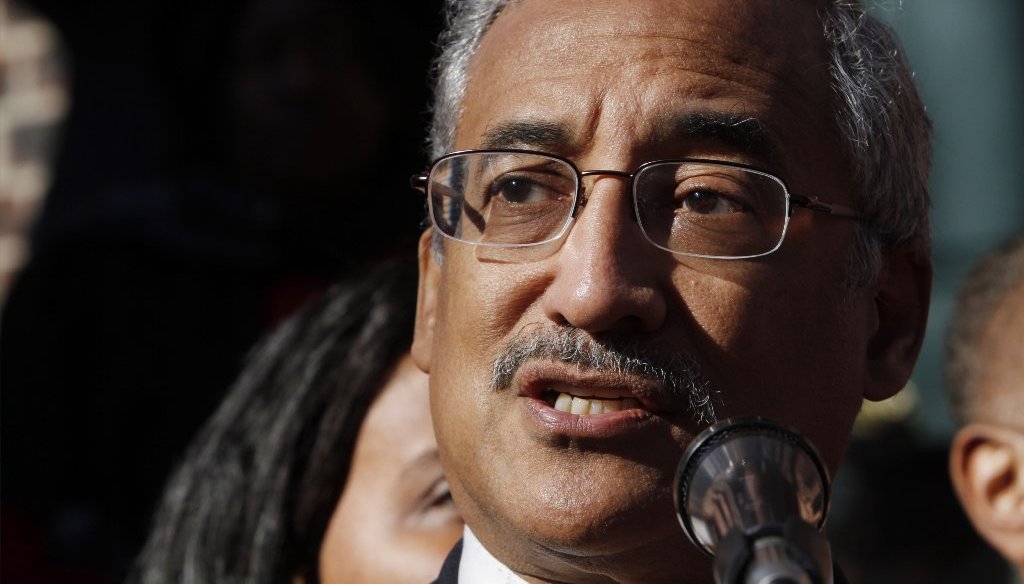



Rep. Bobby Scott often cites income equality in his calls to raise the minimum wage and increase taxes on the wealthy. (Photo by AP)
U.S. Rep. Bobby Scott has long complained about the gap between rich and poor in the United States.
"When measuring income inequality across the globe, after accounting for taxes and transfers, the United States ranks second worst in income inequality across developed countries," Scott, D-3rd, wrote in a June 12 statement.
Scott made the comment in explaining his vote against a sweeping trade agreement with Asian nations; he said thinks it would depress U.S. wages. The congressman has also cited income inequality in his calls to raise the minimum wage and increase taxes on the wealthy. We recently gave a Mostly True rating to his claim that U.S. income disparity is at it highest level since the 1920s.
This time, we wondered whether Scott is right about the United States’ global ranking.
DeMontre Boone, a legislative assistant to Scott, said the congressman drew his information from a December 2013 article by the Pew research Center headlined "Global Inequality: How the U.S. compares."
Pew defined developed countries as those belonging to the Organization for Economic Development and Cooperation, a group of 34 democratic nations seeking to improve trade.
The OECD calculates the inequality of income distribution in terms of what’s called a Gini coefficient that ranges on a scale from zero to one. Zero means there’s perfect equality and every household earns the same income. One means there’s absolute inequality and a single household earns a country’s entire income. All nations fall somewhere in between.
The Pew article, drawing mostly on 2010 calculations, has a chart placing the U.S. 10th highest among OECD nations in income inequality measured before taxes and transfers -- payments such as welfare and Social Security that a government makes to people without an exchange of goods or services. The U.S. Gini rating was .499, well behind the leader, Ireland, who came in at .591.
Scott, you’ll remember, focused his comments on earnings after tax and transfers. And when that bottom-line data was computed, the U.S. surged to No. 2 on the disparity chart, with a .38 Gini. Chile, with a .501 coefficient, had the greatest inequality.
So Scott cited information in the Pew chart correctly. But two issues still arise:
So let’s look at this again, armed with data mostly from 2012 that includes all OECD nations. When it comes to income inequality before taxes and transfers, the U.S. ranked 7th. Here’s a list of those seven countries and the Gini coefficients:
Now, let’s examine income equality after taxes and transfers -- the core of Scott’s claim. The U.S. rose to fourth in the rankings here, suggesting that the redistributive effects of our tax and public welfare systems are weaker than some of our trading partners. Here’s the top four list:
Of course not all industrialized nations belong to the OECD. The trade organization also computed Russia’s income inequality for 2012 and the post-tax and transfers rating of .396 was higher than the United States’.
If you’re wondering, the five OECD countries with the lowest post-tax and transfers income disparity -- all with a Gini around .250 -- were Estonia, the Slovak Republic, Slovenia, Norway and Finland.
Our ruling
Scott said, "The United States ranks second worst in income inequality across developed countries," after accounting for taxes and transfers.
Scott bases his claim on an outdated chart listing the statistical disparity in 31 of the 34 OECD nations. Updated information with all the OECD nations shows the U.S. with the fourth highest disparity and it drops another notch if you include non-member Russia.
Clearly, the U.S. ranks near the top among developed nations in income inequality, but not quite as high as Scott says.
We rate his statement Mostly True.
U.S. Rep. Bobby Scott, "Scott statement on trade votes," June 12, 2015.
U.S. Rep. Bobby Scott, "Op-ed: Recommitting ourselves to ending poverty in America," Jan. 30, 2014.
PolitiFact Virginia, "Bobby Scott says U.S. income disparity is widest since 1920s," June 30, 2015.
Email from DeMontre Boone, senior legislative assistant to Scott, July 1, 2015.
The Economist, Economic A-Z Terms, accessed July 7, 2015.
World Bank, Gini Index, assessed July 7, 2015.
Pew Research Center, "Global Inequality: How the U.S. Compares," Dec. 10, 2013.
Organization for Economic Cooperation and Development, "Income Distribution and Poverty," assessed July 7, 2015.
In a world of wild talk and fake news, help us stand up for the facts.
